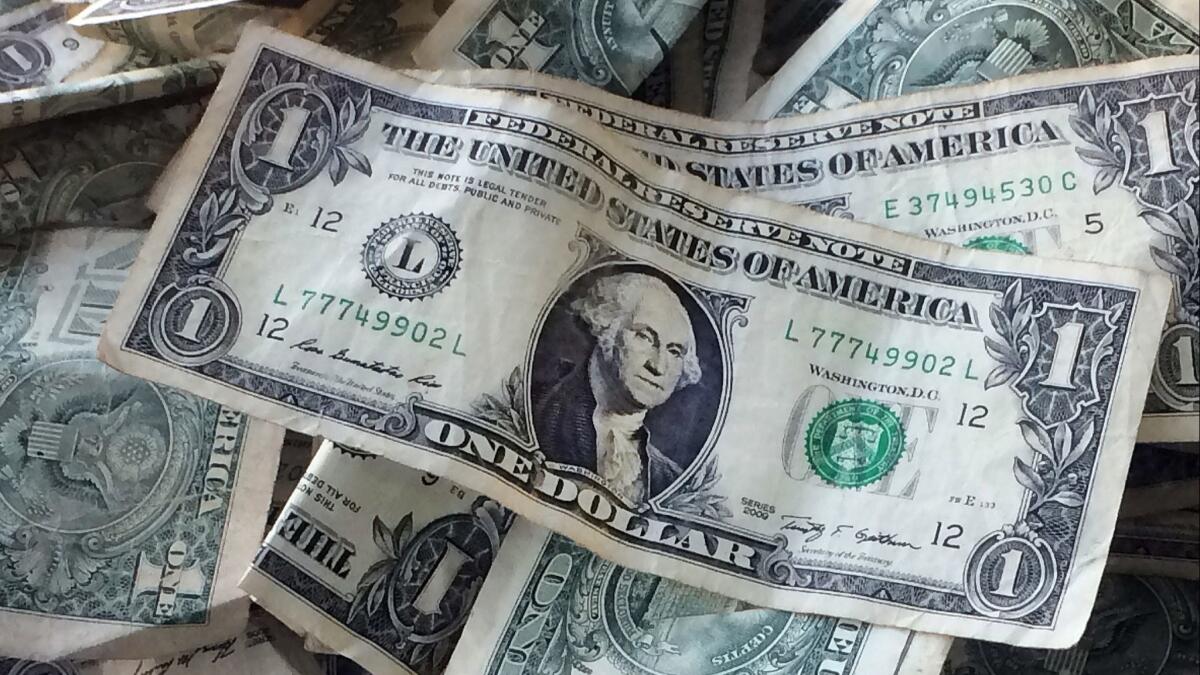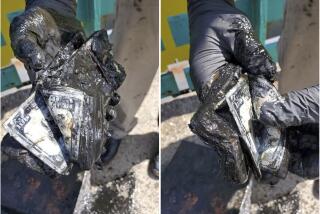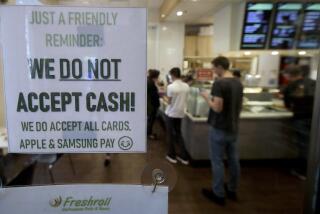Op-Ed: The end of cash. I’m going to miss it

Money is filthy and dirty. This is not a value judgment about capitalism. I’m referring to paper currency and its numerous gluten-adjacent nicknames: bread, dough, cake. The stuff is grimy and besmirched, a carrier for thousands of microbes from wallets, vending machines, purses, fanny packs and sidewalks. Cash also carries pet and rodent DNA, traces of saliva and, 79% of the time, traces of cocaine.
I’m going to miss it.
We’re running currency out of the culture, replacing it with Apple Pay, Venmo, Square, debit cards with team logos, and ever more credit cards. Americans now use plastic with almost twice the frequency of paper money. In cities, money no longer seems to be the coin of the realm, much to the dismay of baristas with empty tip jars.
But something is lost when we find ourselves estranged from cash. We lose the stories associated with it as well as its extrinsic value. Nobody’s grandfather, after all, is jiggling loose bitcoin in his pockets.
Paper money that has done hard time circulating through the bloodstream of the monetary system has its own distinctive character. Paper bills are functional artifacts, some starchy and stiff, or worn smooth like a swatch of cloth. And don’t get me started on coins; breaking open a piggy bank and having a tsunami of change tumble forth is one of the primal thrills of childhood.
Cash carries pet and rodent DNA, traces of saliva and, 79% of the time, traces of cocaine. I’m going to miss it.
Except when we gain or lose a lot of it, money is an abstraction to many of us now, mere numbers on a banking app. If a young bar patron wants to cadge friendly cash for drinks, he’s more likely to get a ping on a smartphone app than a fistful of beer-stained bills. Me, I love beer-stained bills. And what of crime novelists, who must now contend with an entirely new set of symbols: duffle bags full of crypto currency-laden thumb drives, perhaps, or train lockers containing banking PINs.
The man who taught me about the wonder of money was my grandfather Joseph, a Polish immigrant who arrived at Ellis Island from Krakow in the 1920s and — after a tricky spell in which he nearly starved to death — found a job sewing hems on men’s trousers in Manhattan’s Garment District for the next 30 years. Joe regarded his money as magic, and it was. It turned his labors into what he needed to survive and then raise a family. Every week, Joe would cash his paycheck and pull out his color-coded accordion file. The money would then go into its designated slot: $17 in the red electricity folder, $23 in the blue water folder, and so on. Here was a man for whom paper money was not an abstraction.
Cash, to Joe, was a conduit for joy. He would pass it on to me and my sister in the form of quarters produced from behind an ear, or a five-dollar bill that fluttered out of a greeting card. Gift cards, of which there are hundreds of varieties, aren’t exactly emissaries of delight. Until his death, Joe’s money always carried a distinctive scent — hair gel, nicotine and liniment — that I will forever associate with monetary presents.
When I opened my first bank account, my mother showed me how to properly write a check: write out the amount in words, draw a long line across the pay line if it’s a whole amount, or a fractional number if it isn’t. There was also that intimidating ledger in the back of the checkbook reminding me to tally every cent I deposited or withdrew. As a young wage earner, I found that nothing kept me motivated to work hard like a detailed record of my finances.
Today my wallet contains more meaningless receipts than it does greenbacks, but every once in a while I take a stack of real bills out of the ATM and hold them in my hand.
I recommend it. It reminds us why we spend so many waking hours on freeways. Why we work more than we play. Why, in fact, we need the magic that turns our labors into joy.
Marc Weingarten is the author of “Thirsty: William Mulholland, California Water and the Real Chinatown.”
Follow the Opinion section on Twitter @latimesopinionand Facebook
More to Read
A cure for the common opinion
Get thought-provoking perspectives with our weekly newsletter.
You may occasionally receive promotional content from the Los Angeles Times.










